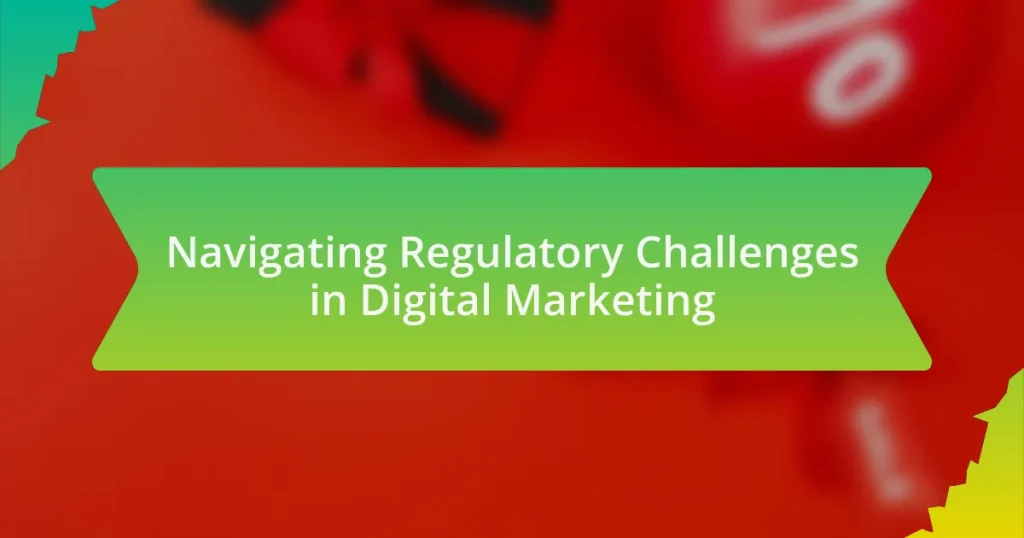The article focuses on navigating regulatory challenges in digital marketing, highlighting key issues such as data privacy compliance, advertising standards, and consumer protection laws. It discusses the impact of privacy regulations like the GDPR and CCPA on marketing strategies, emphasizing the necessity for explicit consumer consent and the importance of transparency. Additionally, the article outlines specific regulations marketers should be aware of, regional variations in compliance requirements, and the consequences of non-compliance, including legal penalties and reputational damage. Strategies for ensuring compliance, adapting to regulatory changes, and fostering a culture of compliance within organizations are also examined.

What are the key regulatory challenges in digital marketing?
Key regulatory challenges in digital marketing include data privacy compliance, advertising standards, and consumer protection laws. Data privacy regulations, such as the General Data Protection Regulation (GDPR) in Europe, impose strict guidelines on how companies collect, store, and use personal data, requiring transparency and consent from users. Advertising standards, enforced by organizations like the Federal Trade Commission (FTC) in the United States, mandate truthful advertising and prohibit deceptive practices, which can complicate marketing strategies. Additionally, consumer protection laws aim to safeguard consumers from unfair practices, necessitating that digital marketers remain vigilant about compliance to avoid legal repercussions. These challenges require ongoing adaptation to evolving regulations and enforcement practices.
How do privacy laws impact digital marketing strategies?
Privacy laws significantly impact digital marketing strategies by imposing restrictions on data collection, usage, and sharing practices. These regulations, such as the General Data Protection Regulation (GDPR) in Europe and the California Consumer Privacy Act (CCPA) in the United States, require marketers to obtain explicit consent from consumers before collecting personal data. This shift necessitates a reevaluation of targeting methods, as marketers must prioritize transparency and user privacy, often leading to a reliance on first-party data and contextual advertising. According to a 2021 report by the Interactive Advertising Bureau, 70% of marketers indicated that privacy regulations have forced them to change their data strategies, highlighting the profound influence of these laws on digital marketing practices.
What specific regulations should marketers be aware of?
Marketers should be aware of regulations such as the General Data Protection Regulation (GDPR), the California Consumer Privacy Act (CCPA), and the Federal Trade Commission (FTC) guidelines. GDPR mandates strict data protection and privacy for individuals within the European Union, requiring marketers to obtain explicit consent for data collection and processing. CCPA enhances privacy rights for California residents, allowing them to know what personal data is collected and to opt-out of its sale. FTC guidelines focus on truth in advertising, requiring marketers to avoid deceptive practices and disclose material connections in endorsements. These regulations are crucial for compliance and to avoid legal penalties.
How do these regulations vary by region?
Regulations in digital marketing vary significantly by region, reflecting local laws, cultural norms, and economic conditions. For instance, the European Union enforces strict data protection regulations under the General Data Protection Regulation (GDPR), which mandates explicit consent for data collection and imposes heavy fines for non-compliance. In contrast, the United States has a more fragmented regulatory landscape, with laws like the California Consumer Privacy Act (CCPA) focusing primarily on consumer privacy but lacking a comprehensive federal framework. Additionally, regions like Asia-Pacific may have varying degrees of regulation, with countries such as Australia implementing the Privacy Act, while others may have minimal restrictions. These regional differences highlight the necessity for businesses to adapt their digital marketing strategies to comply with local regulations.
What role does consumer consent play in digital marketing?
Consumer consent is crucial in digital marketing as it ensures compliance with privacy regulations and fosters trust between consumers and brands. By obtaining explicit consent, companies can legally collect, process, and utilize consumer data for targeted advertising and personalized experiences. For instance, regulations like the General Data Protection Regulation (GDPR) mandate that businesses must secure informed consent from users before processing their personal information, thereby emphasizing the importance of transparency and user control. This legal framework not only protects consumer rights but also enhances brand reputation, as consumers are more likely to engage with companies that respect their privacy preferences.
How can businesses ensure they obtain proper consent?
Businesses can ensure they obtain proper consent by implementing clear and transparent consent mechanisms that comply with legal standards such as the General Data Protection Regulation (GDPR). This involves providing individuals with explicit information about what their data will be used for, ensuring that consent is freely given, specific, informed, and unambiguous. For example, businesses should use opt-in forms that require users to actively agree to data processing rather than relying on pre-checked boxes. According to a study by the International Association of Privacy Professionals, 79% of consumers are more likely to trust companies that clearly communicate their data practices, highlighting the importance of transparency in obtaining consent.
What are the consequences of failing to obtain consent?
Failing to obtain consent can lead to significant legal and financial consequences for businesses engaged in digital marketing. Non-compliance with regulations such as the General Data Protection Regulation (GDPR) can result in hefty fines, which can reach up to 4% of a company’s global annual revenue or €20 million, whichever is higher. Additionally, businesses may face reputational damage, loss of customer trust, and potential lawsuits from individuals whose data was mishandled. These repercussions underscore the importance of obtaining explicit consent before collecting or processing personal data in digital marketing efforts.
How do advertising standards affect digital marketing practices?
Advertising standards significantly influence digital marketing practices by establishing guidelines that ensure truthful, transparent, and ethical advertising. These standards, enforced by regulatory bodies such as the Federal Trade Commission (FTC) in the United States, require marketers to avoid misleading claims and to disclose material connections in endorsements. For instance, the FTC mandates that influencers disclose paid partnerships, which directly impacts how brands approach influencer marketing strategies. Compliance with these standards not only helps avoid legal repercussions but also builds consumer trust, as adherence to ethical practices is increasingly valued by audiences.
What are the main advertising standards that apply to digital marketing?
The main advertising standards that apply to digital marketing include the Federal Trade Commission (FTC) guidelines, the General Data Protection Regulation (GDPR), and the Children’s Online Privacy Protection Act (COPPA). The FTC guidelines mandate truthfulness and non-deceptive advertising practices, requiring marketers to substantiate claims and disclose material connections with endorsers. The GDPR establishes strict rules for data protection and privacy, requiring explicit consent for data collection and processing. COPPA specifically protects the privacy of children under 13, imposing requirements on websites and online services directed at children. These standards are essential for ensuring ethical practices and compliance in digital marketing.
How can marketers ensure compliance with these standards?
Marketers can ensure compliance with regulatory standards by implementing comprehensive training programs and regularly updating their practices to align with current laws. This involves staying informed about regulations such as the General Data Protection Regulation (GDPR) and the California Consumer Privacy Act (CCPA), which require transparency in data collection and user consent. Regular audits and assessments of marketing strategies against these regulations can help identify areas of non-compliance, allowing marketers to make necessary adjustments. Additionally, utilizing compliance management tools can streamline the process of adhering to these standards, ensuring that all marketing activities are legally sound and ethically responsible.

What strategies can businesses employ to navigate regulatory challenges?
Businesses can employ several strategies to navigate regulatory challenges effectively. First, they should establish a robust compliance framework that includes regular audits and assessments to ensure adherence to relevant laws and regulations. This framework should be informed by the specific regulatory environment of the industry, such as data protection laws like GDPR in Europe, which mandates strict guidelines on data handling and user consent.
Additionally, businesses can invest in training programs for employees to enhance their understanding of compliance requirements, thereby reducing the risk of violations. For instance, a study by the Ethics & Compliance Initiative found that organizations with comprehensive training programs experience 50% fewer compliance violations.
Furthermore, engaging with legal experts or consultants who specialize in regulatory issues can provide businesses with tailored advice and insights, enabling them to anticipate changes in regulations and adapt accordingly. This proactive approach is crucial in industries like digital marketing, where regulations can evolve rapidly due to technological advancements and shifting consumer expectations.
Lastly, businesses should foster open communication with regulatory bodies to stay informed about upcoming changes and to clarify any ambiguities in existing regulations. This engagement can lead to a more favorable regulatory environment and help businesses align their practices with regulatory expectations.
How can companies stay updated on regulatory changes?
Companies can stay updated on regulatory changes by subscribing to industry newsletters and regulatory alerts. These resources provide timely information on new laws and amendments relevant to their sector. For instance, organizations like the Federal Trade Commission (FTC) and the European Union publish updates that can be directly accessed through their official websites. Additionally, attending industry conferences and webinars can offer insights from experts on upcoming regulatory trends. Engaging with legal counsel specializing in regulatory compliance also ensures that companies receive tailored advice on navigating changes effectively.
What resources are available for tracking regulatory updates?
Regulatory tracking resources include government websites, legal databases, and industry-specific newsletters. Government websites, such as the Federal Register in the United States, provide official updates on new regulations and proposed rules. Legal databases like Westlaw and LexisNexis offer comprehensive access to legal documents, case law, and regulatory changes. Additionally, industry-specific newsletters from organizations such as the Interactive Advertising Bureau (IAB) and the Digital Advertising Alliance (DAA) deliver timely updates relevant to digital marketing regulations. These resources ensure that professionals stay informed about compliance requirements and changes in the regulatory landscape.
How can businesses adapt their strategies in response to changes?
Businesses can adapt their strategies in response to changes by implementing agile frameworks that allow for rapid adjustments to market conditions and regulatory environments. For instance, companies can utilize data analytics to monitor shifts in consumer behavior and regulatory requirements, enabling them to pivot their marketing strategies effectively. A study by McKinsey & Company highlights that organizations with agile practices can respond to changes 2.5 times faster than their competitors, demonstrating the effectiveness of this approach in maintaining compliance and optimizing marketing efforts in a dynamic landscape.
What best practices should marketers follow to ensure compliance?
Marketers should follow best practices such as understanding and adhering to relevant regulations, obtaining explicit consent from consumers, and maintaining transparent data usage policies to ensure compliance. Understanding regulations like GDPR and CCPA is crucial, as these laws dictate how personal data should be handled. Obtaining explicit consent involves clearly informing consumers about data collection and usage, which fosters trust and aligns with legal requirements. Additionally, maintaining transparent data usage policies ensures that consumers are aware of their rights and how their data is being used, which is essential for compliance and can mitigate legal risks.
How can businesses implement effective compliance training?
Businesses can implement effective compliance training by developing a structured program that includes clear objectives, engaging content, and regular assessments. A well-defined training program ensures that employees understand regulatory requirements relevant to digital marketing, such as data protection laws and advertising standards. Engaging content, such as interactive modules and real-life case studies, enhances retention and application of knowledge. Regular assessments, including quizzes and feedback sessions, help reinforce learning and identify areas needing improvement. According to a study by the Society for Human Resource Management, organizations with comprehensive compliance training programs experience a 50% reduction in compliance violations, demonstrating the effectiveness of such initiatives.
What tools can assist in maintaining compliance in digital marketing?
Tools that can assist in maintaining compliance in digital marketing include compliance management software, data privacy tools, and email marketing platforms with built-in compliance features. Compliance management software, such as OneTrust or TrustArc, helps organizations track and manage regulatory requirements, ensuring adherence to laws like GDPR and CCPA. Data privacy tools, like Cookiebot, assist in managing user consent for cookies and tracking, which is crucial for compliance with privacy regulations. Additionally, email marketing platforms like Mailchimp offer features that help users comply with anti-spam laws by providing easy opt-out options and consent management. These tools collectively enhance compliance efforts by automating processes and ensuring that marketing practices align with legal standards.

What are the implications of non-compliance in digital marketing?
Non-compliance in digital marketing can lead to significant legal and financial repercussions for businesses. Companies may face hefty fines, with penalties for violations of regulations such as the General Data Protection Regulation (GDPR) reaching up to 4% of annual global turnover or €20 million, whichever is higher. Additionally, non-compliance can damage a brand’s reputation, resulting in loss of customer trust and loyalty, which can further impact sales and market position. Furthermore, businesses may encounter restrictions on their marketing activities, limiting their ability to reach potential customers effectively. These implications underscore the necessity for adherence to regulatory standards in digital marketing practices.
What penalties can businesses face for regulatory violations?
Businesses can face various penalties for regulatory violations, including fines, sanctions, and legal action. For instance, the Federal Trade Commission (FTC) can impose fines that range from thousands to millions of dollars depending on the severity of the violation, such as misleading advertising or data privacy breaches. Additionally, businesses may encounter operational restrictions, such as being required to change their marketing practices or undergo compliance audits. In severe cases, regulatory violations can lead to criminal charges against executives, resulting in imprisonment. These penalties serve as deterrents to ensure compliance with laws governing digital marketing practices.
How do these penalties vary across different jurisdictions?
Penalties for regulatory violations in digital marketing vary significantly across jurisdictions, reflecting differences in legal frameworks and enforcement practices. For instance, the European Union imposes stringent penalties under the General Data Protection Regulation (GDPR), where fines can reach up to 4% of a company’s global annual revenue or €20 million, whichever is higher. In contrast, the United States has a more fragmented approach, with penalties varying by state; for example, California’s Consumer Privacy Act (CCPA) allows for fines of up to $7,500 per violation, while other states may have less severe consequences. This disparity illustrates how local laws and regulatory bodies influence the severity and nature of penalties in digital marketing practices.
What are the long-term impacts of non-compliance on a brand’s reputation?
Non-compliance can severely damage a brand’s reputation over the long term by eroding consumer trust and leading to negative public perception. When a brand fails to adhere to regulations, it risks being associated with unethical practices, which can result in customers choosing competitors who demonstrate compliance and integrity. For instance, a study by the Reputation Institute found that 70% of consumers are more likely to purchase from brands they perceive as ethical and compliant with regulations. Additionally, non-compliance can lead to legal penalties and financial losses, further tarnishing a brand’s image. Over time, these factors contribute to a decline in brand loyalty and market share, making recovery increasingly difficult.
How can businesses recover from compliance failures?
Businesses can recover from compliance failures by implementing a comprehensive remediation plan that includes assessing the root causes, enhancing training programs, and establishing robust monitoring systems. First, businesses must conduct a thorough analysis to identify the specific compliance failures and their underlying causes, which can help prevent recurrence. For instance, a study by the Compliance and Ethics Institute found that organizations with strong compliance training programs experience 50% fewer violations. Next, enhancing employee training ensures that all staff are aware of compliance requirements and best practices, fostering a culture of accountability. Finally, establishing ongoing monitoring and auditing processes allows businesses to detect potential compliance issues early, enabling timely corrective actions. This proactive approach not only mitigates risks but also restores stakeholder trust and confidence in the organization.
What steps should be taken immediately after a violation?
Immediately after a violation, the first step is to assess the situation to understand the nature and extent of the violation. This involves gathering all relevant information and documentation related to the incident. Next, it is crucial to notify the appropriate internal stakeholders, such as compliance officers or legal teams, to ensure that the organization is aligned in its response. Following this, the organization should take corrective actions to mitigate any potential harm, which may include ceasing the violating activity and implementing measures to prevent future occurrences. Additionally, if required by law or regulation, the organization must report the violation to the relevant regulatory authorities within the specified timeframe. These steps are essential to demonstrate accountability and compliance, as failing to act promptly can lead to increased penalties or reputational damage.
How can companies rebuild trust with consumers post-violation?
Companies can rebuild trust with consumers post-violation by implementing transparent communication, taking accountability, and demonstrating commitment to change. Transparent communication involves openly addressing the violation, explaining the circumstances, and outlining steps taken to rectify the situation. For instance, after a data breach, companies like Target issued public apologies and detailed their security enhancements, which helped restore consumer confidence. Taking accountability means acknowledging the mistake without deflecting blame, as seen when Facebook admitted to privacy missteps and committed to stricter data policies. Demonstrating commitment to change includes actively engaging with consumers through feedback mechanisms and showing improvements over time, which can be evidenced by increased customer satisfaction ratings following corrective actions.
What practical tips can help marketers navigate regulatory challenges?
Marketers can navigate regulatory challenges by staying informed about relevant laws and regulations, implementing compliance training, and utilizing technology for monitoring. Staying updated on regulations such as GDPR and CCPA is crucial, as these laws dictate how personal data can be collected and used. Compliance training ensures that all team members understand these regulations and their implications for marketing practices. Additionally, employing technology solutions like data management platforms can help marketers track consent and manage customer data in accordance with legal requirements. These strategies collectively enhance a marketer’s ability to operate within legal frameworks while effectively reaching their audience.
How can businesses create a culture of compliance within their teams?
Businesses can create a culture of compliance within their teams by implementing comprehensive training programs that emphasize the importance of regulatory adherence. These training programs should be tailored to the specific regulations relevant to the industry, such as data protection laws in digital marketing, and should include real-world scenarios to illustrate compliance challenges. Research indicates that organizations with regular compliance training see a 50% reduction in violations, demonstrating the effectiveness of education in fostering a compliant workplace. Additionally, establishing clear communication channels for reporting compliance issues and recognizing employees who exemplify compliance can further reinforce this culture.
What are the most effective ways to communicate regulatory changes to staff?
The most effective ways to communicate regulatory changes to staff include utilizing clear and concise written communications, conducting training sessions, and leveraging digital platforms for updates. Clear written communications, such as emails or memos, ensure that all staff members receive the same information in an easily digestible format. Training sessions provide an interactive environment where staff can ask questions and clarify their understanding of the changes. Digital platforms, such as intranet updates or webinars, allow for timely dissemination of information and can reach remote employees effectively. Research indicates that organizations that employ multiple communication methods see a 70% increase in staff understanding of regulatory changes, highlighting the importance of a multifaceted approach.


